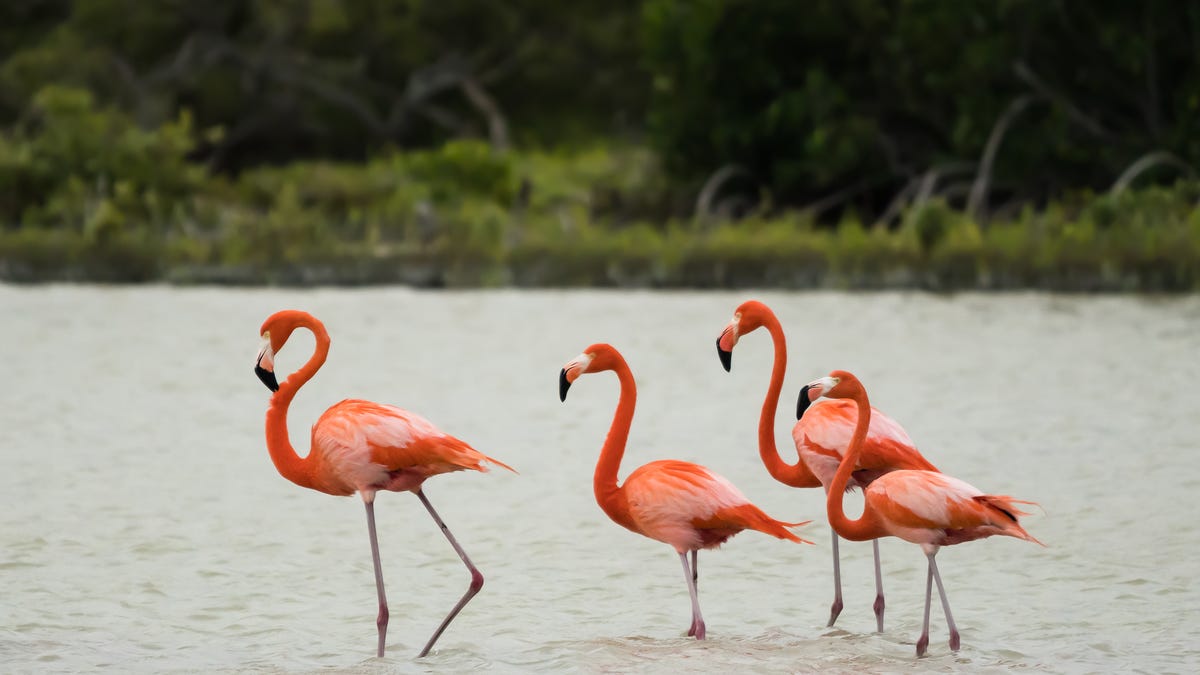Scientists Find Flamingos Acting Like Cliquey High Schoolers
"You can't sit with us," says a popular flamingo, probably.

A group of Caribbean flamingos hanging out.
When Tina Fey and Rosalind Wiseman wrote the quintessential line "on Wednesdays, we wear pink" in their Mean Girls script, they had no idea it would one day apply to a scientific study about flamingos.
In Mean Girls, this quote is delivered to the newest member of an elite high school clique so she won't mess up the vibe when they sit together during lunch.
And in the journal Scientific Reports, researchers with the University of Exeter and Wildfowl & Wetlands Trust announced that flamingo societies in the Caribbean and Chilé seem to have cliques of their own based on personality preferences. The news even arrived on a Wednesday.
Thank goodness these birds are already dressed for the occasion.
"It is clear from this research that a flamingo's social life is much more complicated than we first realized," Paul Rose, from WWT and Exeter's Centre for Research in Animal Behaviour and lead author of a study published in the journal Scientific Reports, said in a statement.
The partner of one Caribbean flamingo helps in an argument with another pair of flamingos.
According to Rose, whose name beautifully follows with the theme of this article, previous research had shown that individual flamingos have particular "friends" within their flock. Plus, Rose's work not only proved that flamingos love kinship, but also confirmed that these animals are long-term relationship types. Their bonds, more often than not, stand the test of time.
The team wanted to learn whether there was a reason for these friend groups or if they're totally random. In other words, are there certain character traits and personality types that dictate who is friends with whom?
"The answer is yes," Rose said.
For instance, after separately observing groups of the Caribbean and Chilean flamingos, Rose and colleagues found that bolder birds had stronger and more consistent ties with other bold birds. Submissive birds, on the other hand, preferred hanging out with their submissive peers. Introverts unite!
Two Caribbean flamingos are seen ganging up on another bird.
"Like humans, flamingos appear to carve out different roles in society based on their personality," Fionnuala McCully of the University of Liverpool, who collected data for the study while at the University of Exeter, said in a statement.
Notably, per the study, individual Caribbean flamingos seemed more likely to have a particular role in their own group compared with Chilean flamingos. With regard to group dynamics, the researchers even saw that aggressive bird groups would dominate rivals and get into more fights but that submissive birds went for a different approach, including helping their other shy flamingo friends stay strong in the face of adversity.
"The various different personality groups provide social help to their members, for example by supporting each other in the many squabbles that take place in flamingo flocks," McCully said.
Bold Chilean flamingos push away a more submissive bird.
Flamingos aren't the only animal we know of forming friend groups based on private intuition. Chimpanzees and Assamese macaques, for instance, have the same tendency. And beyond that, we know that quite a few animals enjoy making friends in general. Horses, dolphins and even snakes have been seen hanging out with others of their kind.
In 2020, scientists even found evidence that sperm whales have sweet little bromances like they're part of a fraternity.
As such, Rose said, "our findings need further investigation, both to help us understand the evolution of social behavior and to improve the welfare of zoo animals."

